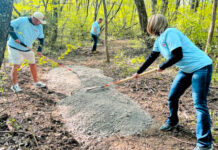Is the H-2B nonimmigrant, seasonal work program in jeopardy?
There’s no reason to panic. Yet.
But battle lines are being drawn for immigrant programs of all stripes since the election of President Donald J. Trump, our 45th president
Trump has made it clear he will implement an agenda, with immigration near the top of his “fix” list, very unlike anything experienced during the previous two administrations. To this point anyway, he’s directed his immigration rhetoric at a large swath of the Mideast, which he has identified as a source for individuals that, if allowed to enter the United States, could carry out terrorist attacks.
But, Trump’s been no less strident in announcing his intention to stop the flow of illegal immigrants crossing the U.S. southern border. He’s also said he will deport illegal immigrants living and working in the United States. The latest Pew Institute research report estimates about 11 million unauthorized immigrants in the United States. About 8 million of them are working or seeking work at any given time, says Pew.
However, there’s more at play here in terms of immigration — perhaps likely even impacting H-2B, the 26-year-old government program that more than 4,000 landscape company owners rely on annually to supplement their work rosters.
Trump’s appointment of U.S. Senator Jeff Sessions (R-Ala.) to attorney general and a bill being introduced by fellow senators David Perdue (R-Ga.) and Tom Cotton (R–Ark.) to dramatically slash the number of “legal” immigrants allowed into the United States, are hardly welcome news to any industry that relies on foreign employees — high-tech or unskilled employees.
The bill being floated by Cotton and Perdue is primarily aimed at greatly reducing the number of immigrants who can obtain green cards and other visas, although H-2B is not specifically targeted.
Sessions is no fan of H-2B. He’s been one of the program’s most outspoken critics.
“Not only have we been told that Americans are not willing to do the jobs that H-2B workers often fill, but also, that employers simply cannot find anyone to do them. They search high and low, but they just cannot find anyone who is willing to drive a truck, anyone willing to build houses or commercial buildings, wait tables, push a lawnmower, or clean hotels,” said Sessions referencing H-2B during a committee hearing in June 2016.
“Yet as we will hear today — with a few exceptions — this is not the case. Not only are there willing Americans, but they are not in short supply,” Sessions continued.
“The impact of the H-2B program is not just on the available job opportunities for American workers — it also affects the wages of American workers who actually manage to find jobs in these fields.”
Now confirmed as Trump’s attorney general, Sessions will become one of the most powerful people overseeing the nation’s immigration policy.











![[VIDEO] Dickies®: Discover Workwear That’s Anything But Uniform](https://turfmagazine.com/wp-content/uploads/2023/06/1647663814-4b1a2a7742790a9b1e97a3b963477850192e1d6a9dfba9b07214a77bae25d6e3-d-218x150.jpg)




























![[VIDEO] Dickies®: Discover Workwear That’s Anything But Uniform](https://turfmagazine.com/wp-content/uploads/2023/06/1647663814-4b1a2a7742790a9b1e97a3b963477850192e1d6a9dfba9b07214a77bae25d6e3-d-324x160.jpg)